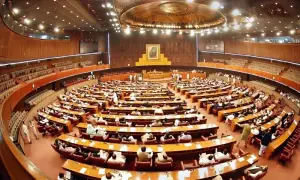US Congress set to pass $1.2 trillion infrastructure bill
4 min readWASHINGTON: US lawmakers were set to vote Friday on a landmark $1.2 trillion infrastructure package that would transform America's crumbling transport network and boost internet coverage on the biggest day so far of Joe Biden's presidency.
The House of Representatives was expected to rubber stamp the legislation after a procedural vote to send an even larger "Build Back Better" social welfare bill to the Senate -- passing legislation with a combined price tag of $3 trillion on potentially the most expensive day in the lower chamber's history.
"Poll after poll shows us that the components of the bipartisan infrastructure deal and the Build Back Better framework are very popular," Biden spokeswoman Karine Jean-Pierre told reporters amid a flurry of 11th hour negotiations in Congress Thursday.
"American families want historic investments in infrastructure... in competitiveness, and addressing the climate crisis. This is something that they want to see happen."
The infrastructure deal's final approval would mark a resounding victory for Biden, a former senator who touts his ability to reach across the aisle but has seen his approval ratings nosedive, partly due to his stalled domestic agenda.
The vote caps months of tense negotiations on Capitol Hill since the Senate approved the package in August, giving it rare bipartisan support in Washington's highly-polarized political atmosphere.
Congressional Democratic leaders initially indicated they wanted the House to sync with the Senate in the summer but it was held up by wrangling over the size and scope of the connected $1.75 trillion Build Back Better bill.
By funding work on roads, bridges and ports and high-speed internet, the White House says the infrastructure deal would create thousands of high-paying jobs for people without college degrees.
**- Divisions -**
The plan provides for $550 billion in new federal spending on transport infrastructure, but also for broadband expansion, clean water measures, electric charging stations and other measures to fight climate change.
The total price tag -- the equivalent of Spain's 2020 gross domestic product -- relies on other public funds that have already been appropriated.
Needing just a simple majority, it passed the Senate by 69 votes to 30 with backing from a third of Republican Senators.
It will be sent to Joe Biden's desk to be signed into law if the make-or-break vote gets rubber-stamped by the House, where leadership has spent weeks trying to heal divisions in the Democratic majority.
Biden originally proposed some $2 trillion in infrastructure spending over eight years, including funding for some of his priorities like climate change mitigation, child care, schools and social services.
Senate Republicans firmly opposed any inclusion of such projects, however, saying only traditional infrastructure like roads, airports should be included, along with the internet upgrades.
Despite its bipartisan support in the Senate, most House Republicans are expected to withhold their support for the infrastructure package after former president Donald Trump threatened reprisals for helping to hand Biden a political win.
The bill is a primary element of Biden's sweeping domestic agenda aimed at structuring a greener, more equitable economy with around $3 trillion in federal spending.
**- Major investments -**
Congressional Democrats are still haggling over the Build Back Better package that includes major investments in health, education, tackling climate change and expanding social welfare programs.
Friday's effort marks a reversal from a long-established plan by House progressives to pass infrastructure only after receiving assurances of support on Build Back Better from their Senate colleagues.
Lawmakers spent Thursday stating their objections to the absence of a budget score, prescription drug pricing curbs, pro-immigration provisions, reforms to the state and local taxation regime and a methane levy.
Pelosi prides herself on never bringing a vote to the floor for which she has not already garnered sufficient backing, however -- suggesting she was able to twist enough arms in the House to get consensus.
Success on Build Back Better would be something of a Pyrrhic victory, however, for lawmakers who fear the bill will be changed beyond recognition in the Senate by moderates including West Virginia's Joe Manchin, who continues to stiff-arm a deal.
"It's always a concern. I'm of the school that every day we delay over here and have a false start, it just empowers (Manchin) more," House Budget Committee Chairman John Yarmuth told political newspaper The Hill.
For the latest news, follow us on Twitter @Aaj_Urdu. We are also on Facebook, Instagram and YouTube.

























Comments are closed on this story.